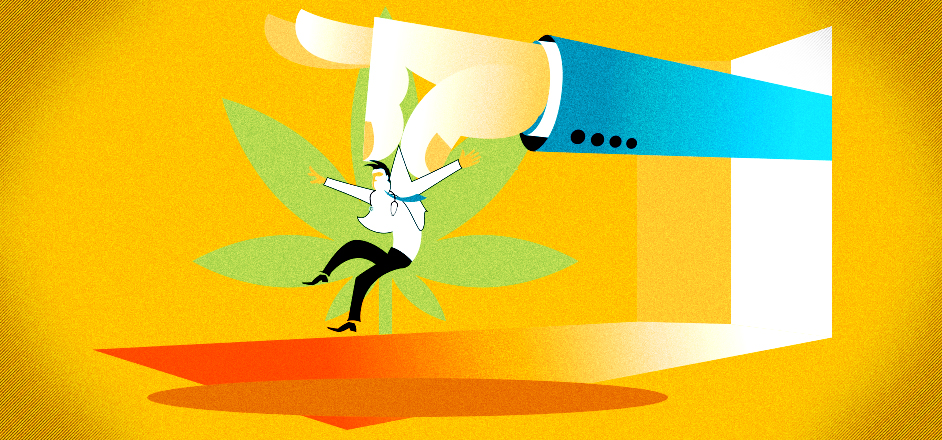One doctor lost his license for using weed, the only medicine that was good for him …
There's one medicine doctors are not allowed to use, at least not on themselves — cannabis. If they do, they risk losing their right to practice medicine.
This was the case with Denver's Paul Bregman, who lost his medical license after admitting to the state government that he was using cannabis to treat his bipolar type II.
To this day, any doctor who admits to being a medical marijuana patient risks the same loss of livelihood, since many states prohibit any doctor from using cannabis "habitually."
"You cannot have a medical card and an active medical license," Bregman says. All those pot doc shops you see? The docs inside probably aren't medical cannabis users themselves.
Bregman's story brings up a basic question: is cannabis a medicine, or isn't it? If it isn't a medicine, why can doctors recommend it? If it is a medicine, why can't doctors use it?
Bregman is a bald, glasses-wearing guy with a talkative, outgoing demeanor, chatting up servers in restaurants and bad mouthing some recent film he thinks is overrated. Cannabis lets him be this active and outgoing, he says — otherwise he'd be on the floor. "Cannabis is my other people's prozac," he says. "For me, it's malpractice for doctors not to use cannabis."
His story is a common one in the cannabis world, a world of unexpected medical benefits. Bregman worked as a radiologist at Denver's county hospital from 1988 to 1995, before depression forced him to retire. After that, he spent a horrible decade thinking about suicide half the time, and, every winter for six years, getting electrodes hooked up to his skull for electroshock therapy. Bregman tried dozens of medicines, from lithium to seroquel to prozac to abilify. All of this helped somewhat, but he was still depressed and thinking of suicide.
Bregman says he first tried cannabis for his bipolar in 2005, and it "changed my life." He's not anti pills; Bregman still uses depakote and valium, pharmaceutical drugs, to manage his mood. "Everybody needs a cocktail of medicines, and also add on structure and exercise and therapy," Bregman says. "Cannabis should be right up there with the other ones." If he had known about cannabis earlier, he says, he would not have have had spent a decade in mental hell, and he would have been productive.
Medical boards, which regulate whether doctors can practice, don't see cannabis as a medicine for doctors, they see it as a vice. And there's no sign they're changing their tune. Just last year, the national organization that advises state medical boards included marijuana on the list of substances that impair ability, and call for disciplinary action. So now doctors using cannabis "habitually" fall under the same "unprofessional or dishonorable" category as doctors who, for example, have sex with their patients or milk dying people out of money by claiming an incurable illness can be cured.
This isn't just a Colorado thing. In 2007, agents from California's medical board walked into the Los Angeles clinic of Dr. Allan Frankel, who was using an ounce of marijuana a month for back pain, and said they were investigating him. They eventually let him keep his license after they worked out an agreement. A call to Dr. Frankel's office has not been returned as of press time.
“The practice of medicine is fundamentally the practice of good judgement," emails Anisha Gianchandani, spokesperson for anti-pot group Smart Approaches to Marijuana, and "statistics show marijuana use linked with impaired memory and attention."
Doctors who are using cannabis are doing so under the radar, perhaps scared by stories like Bregman's. When Bregman told the state in 2011 that he was using cannabis successfully for his problems, with the approval of his psychiatrist, he assumed they would be supportive that he had found something that worked. They weren't. After a 3 year fight over his license, it's now inactive. He says he's angry that the board made him choose between being a doctor and using the medicine that works for him.
"Instead of helping me, they would have rather seen me suffer and, ultimately, commit suicide," Bregman says.
These days, Bregman is doing well. Even if the official medical world hasn't changed its tone on cannabis, the wider world has. And so, Bregman is working as a consultant at Medical Cannabis Consulting, advising the thriving new marijuana industry about how to use a drug that helped him so much — and ultimately cost him his career.
A call to the Colorado Medical Board to discuss the issue of doctors using pot has also gone unreturned.




Leave a Reply